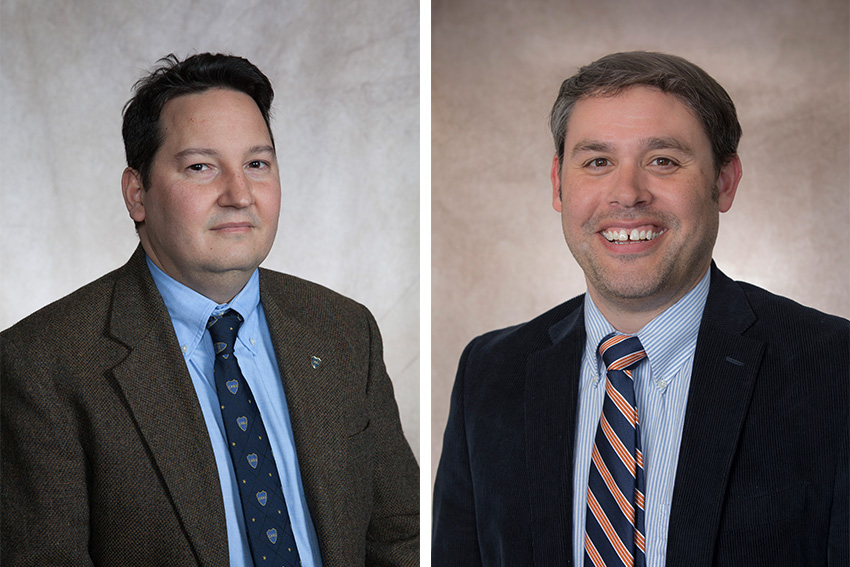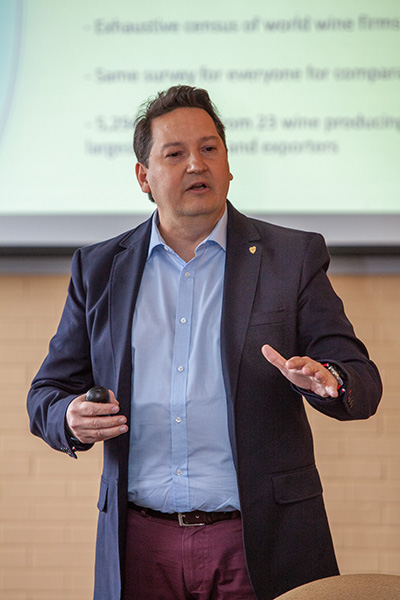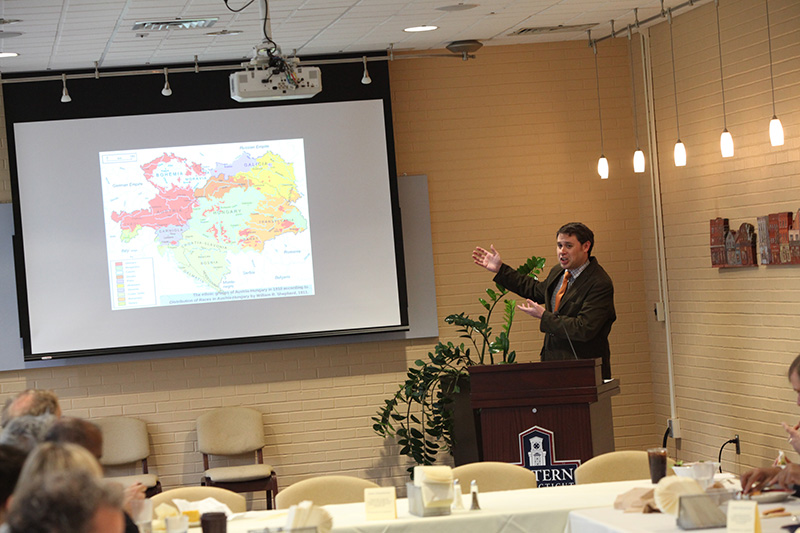- Apply
- Visit
- Request Info
- Give
2 professors win Board of Regents awards for teaching, research
Written by Lucinda Weiss
Published on May 30, 2023

Two Eastern Connecticut State University faculty were recognized for excellence in teaching and research by the Connecticut Board of Regents in its annual faculty awards.
Emiliano Villanueva, associate professor of business administration, was one of four professors in the Connecticut State Colleges and Universities (CSCU) system to win a campus-based Board of Regents Research Award. Scott Moore, associate professor of history, won one of three campus-based Board of Regents Teaching Awards given to CSCU faculty.
The annual awards recognize faculty “who have distinguished themselves as outstanding teachers or are doing exceptional research, scholarly and/or creative work that informs what they do in the classroom,” according to the Board of Regents.
Emiliano Villanueva

Villanueva, who has taught at Eastern for 10 years, has devoted his research for the past 30 years to the business and economics of the wine industry. A member of the American and the European associations of wine economists, he studies trends in the industry and in consumer behavior.
“Wine is one of the most globalized products in terms of trade,” said Villanueva. While the industry traditionally flourished in France, Spain and countries more traditionally associated with wine, consumption is growing in China and in the United States, where all 50 states now have wineries, he noted. The United States now ranks highest in the world in consumption of wine by volume.
Villanueva grew up in Mendoza, Argentina, the wine capital of South America, where his family had vineyards. He managed wineries in Spain and Argentina and obtained a master’s degree from the world’s first wine-related MBA program, at the University of Paris. He earned his doctorate in economic history from the University of Barcelona.
He has studied the economics of the wine industry in Connecticut as well as around the world. With other wine researchers, Villanueva is contributing to a database comparing 5,500 wineries in 23 wine-producing regions. His concentration in the study is on Argentina and the United States, and he has two journal articles in progress analyzing the data. The group of researchers has held workshops in Argentina and Portugal and will hold one at Eastern next spring.
In the past five years Villanueva has published six articles in peer-reviewed journals and made more than 24 conference presentations. At Eastern he has led students in 16 independent studies.
Scott Moore

Moore has taught at Eastern since 2016, after earning his Ph.D. in 2015 from the University of Maryland. His specialty is European history. He teaches courses ranging from introductory surveys to upper-level classes on modern and central Europe and topics such as the Holocaust.
He came to Eastern because he was “really excited by the possibility of teaching at a liberal arts university,” he said, where teaching is valued as well as research. Moore’s goal is to help students “see the world a little clearer and develop a passion for history.” The History Department has recently attracted students who go on to pursue a master’s degree in history and library science so that they can work with historical documents, he noted. Many others go on to teach high school history courses.
Current events such as the war in Ukraine have spurred student interest, Moore said. His course on the history of Russia this spring attracted students wanting to better understand the area. “Current events made me think about how to present the material,” he said.
Beyond making the material approachable and interesting, his philosophy of teaching includes making his expectations clear so that students have no surprises about what to expect. On the first day of class, he makes sure they understand what is due, how exams will be structured and how they will be evaluated.
Moore’s research in Europe was temporarily interrupted by COVID, and he began working on a project about witchcraft and a famous witch trial in Virginia, where he grew up. It complemented his interest in European folklore and monster stories. He is completing a book about the witch trial and how its legacy affected the culture in Virginia.
Eastern’s advantage in teaching is the ability of students to participate in research, he said. “Students have the opportunity because we work so closely with them — we can make that happen,” he said.


